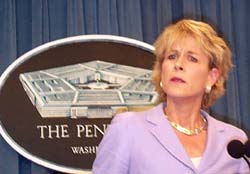Victoria Clarke
Victoria "Torie" Clarke, citing "personal reasons", resigned, effective Friday, June 20, 2003, as Assistant Secretary of Defense for Public Affairs. [1]
Clarke was nominated by President George W. Bush to be the Assistant Secretary of Defense for Public Affairs on April 5, 2001. She was confirmed by the Senate on May 17, 2001, and sworn in at a ceremony in the Pentagon on May 22, 2001. In the position, Clarke was responsible for U.S. Department of Defense public information, internal information, community relations, information training, and audiovisual matters.
In September 2003 Clarke joined CNN TV network as a political and policy analyst. [5] In December 2003, Comcast Corporation announced that it had hired Clarke as their new Senior Advisor for Communications and Government Affairs. [2]
Since 2007 and into April, 2008, Clarke was an on-air consultant and news analyst for the ABC TV network. [3]
Contents
"Psyops on steroids" via military analysts
In early 2002, as "detailed planning for a possible Iraq invasion" began, then-Assistant Secretary of Defense for Public Affairs Victoria Clarke launched an effort to recruit "key influentials" to help sell a wary public on the war, reported the New York Times's David Barstow in April 2008. Clarke and her senior aide, Brent T. Krueger, eventually signed up more than 75 retired military officers, who appeared on television and radio news shows as military analysts, and/or penned newspaper op/ed columns. The Pentagon referred to the military analysts as "message force multipliers" or "surrogates," and held weekly meetings with them, which continued at least until the time of the April 2008 Times report. [4]
The Defense Department also paid for some analysts to travel to Iraq and Guantanamo Bay, encouraging them to counter negative press with Pentagon talking points. Former NBC military analyst Kenneth Allard called the effort "psyops on steroids." Many of the analysts were also lobbyists for defense contractors, and boasted of their Pentagon access to potential clients. This financial conflict discouraged the analysts from questioning or criticizing the Pentagon's claims. The Pentagon also tracked what the analysts said, via a six-figure contract with Omnitec Solutions, as William V. Cowan learned. He was fired from the Pentagon analysts group after saying on Fox News that the United States was "not on a good glide path right now" in Iraq. [4]
Background
Clarke was the general manager of the Washington, D.C. office of Hill & Knowlton, a global public relations and marketing firm. She also previously served as President of Bozell Eskew Advertising, a leading issue advocacy and corporate communications company. From 1993 to 1998, Clarke was Vice President for Public Affairs and Strategic Counsel for the National Cable Television Association.
In 1992, Clarke served as Press Secretary for the re-election campaign of President George Herbert Walker Bush. From 1989 to 1992, she was Assistant U.S. Trade Representative under Ambassador Carla Anderson Hills for Public Affairs and Private Sector Liaison. Previously, she served as press secretary to Congressman and then Senator John McCain. In 1982, Ms. Clarke was a press assistant to then Vice President George Bush. From 1979 to 1982, Ms. Clarke worked as an editorial assistant, photographer, and graphics editor for the Washington Star daily newspaper.
Ms. Clarke holds a B.A. degree from George Washington University where she graduated in 1982.
From U.S. Defense Department Biography of Victoria Clarke.
Affiliations
- Intern, Spring 2000, Global Policy Forum/[6]; B.A., M.A. candidate, School of International Training
- Carla Anderson Hills alleged to be "Torie" Clarke's "mentor".[7]
SourceWatch resources
- Donald H. Rumsfeld
- Hill & Knowlton
- Pentagon military analyst program
- Third party technique
- U.S. Department of Defense
- William V. Cowan
External links
References
Articles and other resources
- September 11, 2001 : Attack on America, DoD News Briefing presented by Victoria Clarke, ASD PA 10:16a.m.; September 12, 2001. The Avalon Project, Yale University.
- Victoria "Torie" Clarke, Assistant Secretary of Defense for Public Affairs, "Winning Women."
- "Pentagon Spokeswoman Clarke Resigns," Associated Press, June 16, 2003.
- DIA Hopes to Grow Anthrax Variant to Test Vaccine
